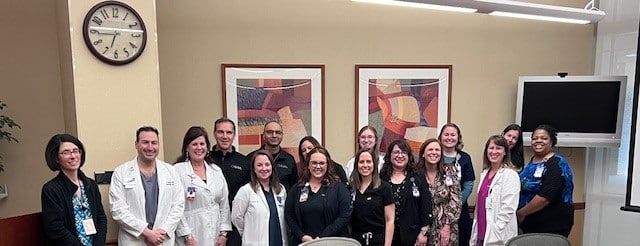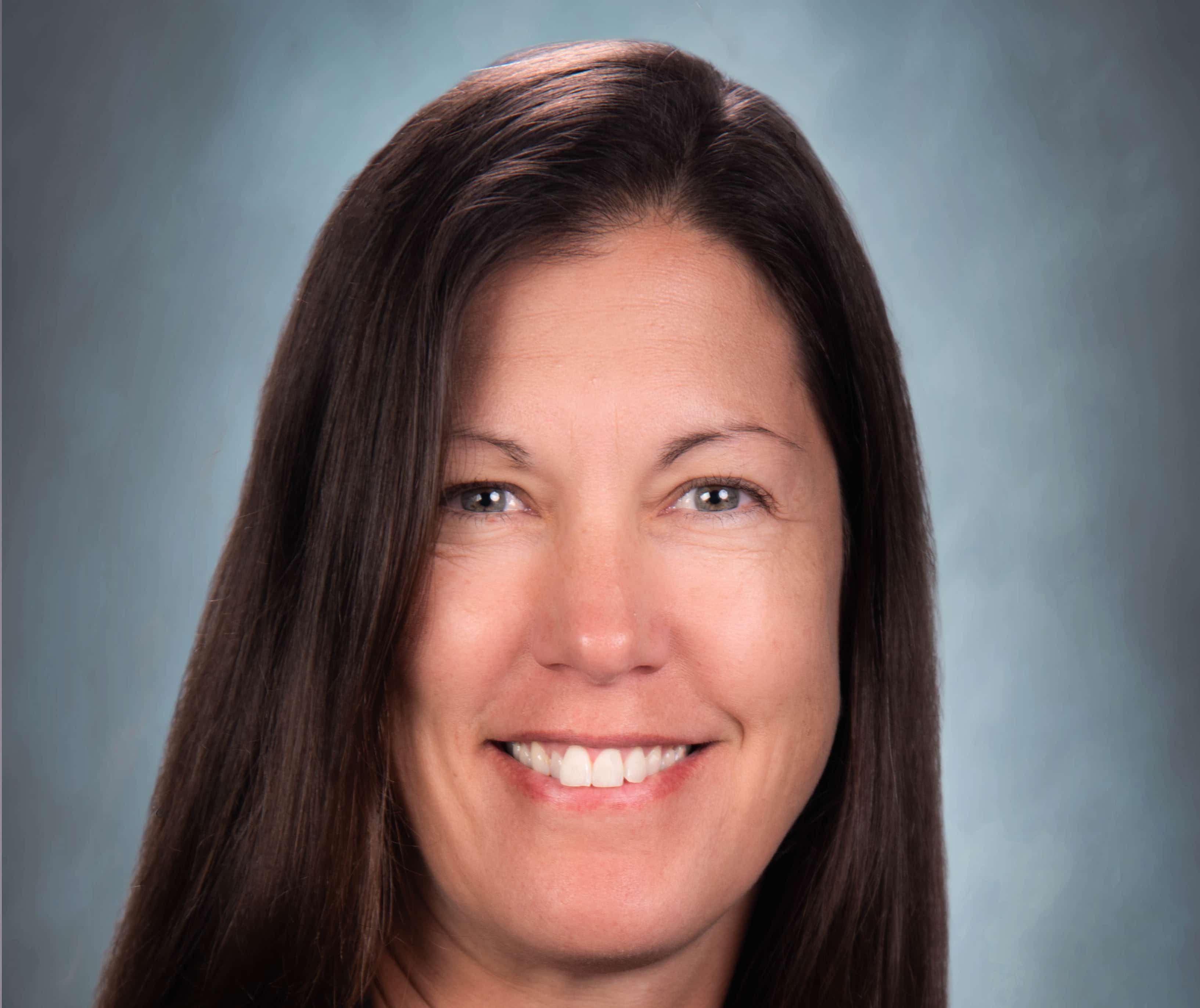Stacey Greenway, director of cardiovascular disease management services at ECU Health Medical Center, was recently appointed as incoming president of the American Association of Cardiovascular and Pulmonary Rehabilitation (AACVPR). Greenway, who recently advocated for rural health care during AACVPR’s Day on the Hill, previously served as a board member for the organization.
“It is an honor to be chosen to lead AACVPR and work alongside my colleagues in cardiovascular care to advance quality and enhance patient outcomes,” said Greenway. “I am eager to provide health care professionals with the best tools and resources to improve patient outcomes and to advocating for policies that recognize the importance of our life-saving work. I also look forward to continued collaboration with health care providers outside of our field of cardiovascular and pulmonary rehab, as we work together to elevate cardiovascular care and provide the highest level of support to our patients.”
Greenway is passionate about advocating for patients and rural health systems in state and national policy and is a leader in cardiovascular disease management. With a background in multidisciplinary rehabilitation practices and public health, Greenway brings experience in clinical leadership and patient advocacy to AACVPR’s mission, which emphasizes advancing the quality of cardiovascular and pulmonary rehabilitation nationwide. AACVPR helps establish standards and advocates for cardiovascular and pulmonary care, addressing the physical, emotional and social needs of patients with chronic diseases. As incoming president, Greenway plans to drive initiatives that support clinical staff and enhance patient access to high-quality, evidence-based rehabilitation programs.
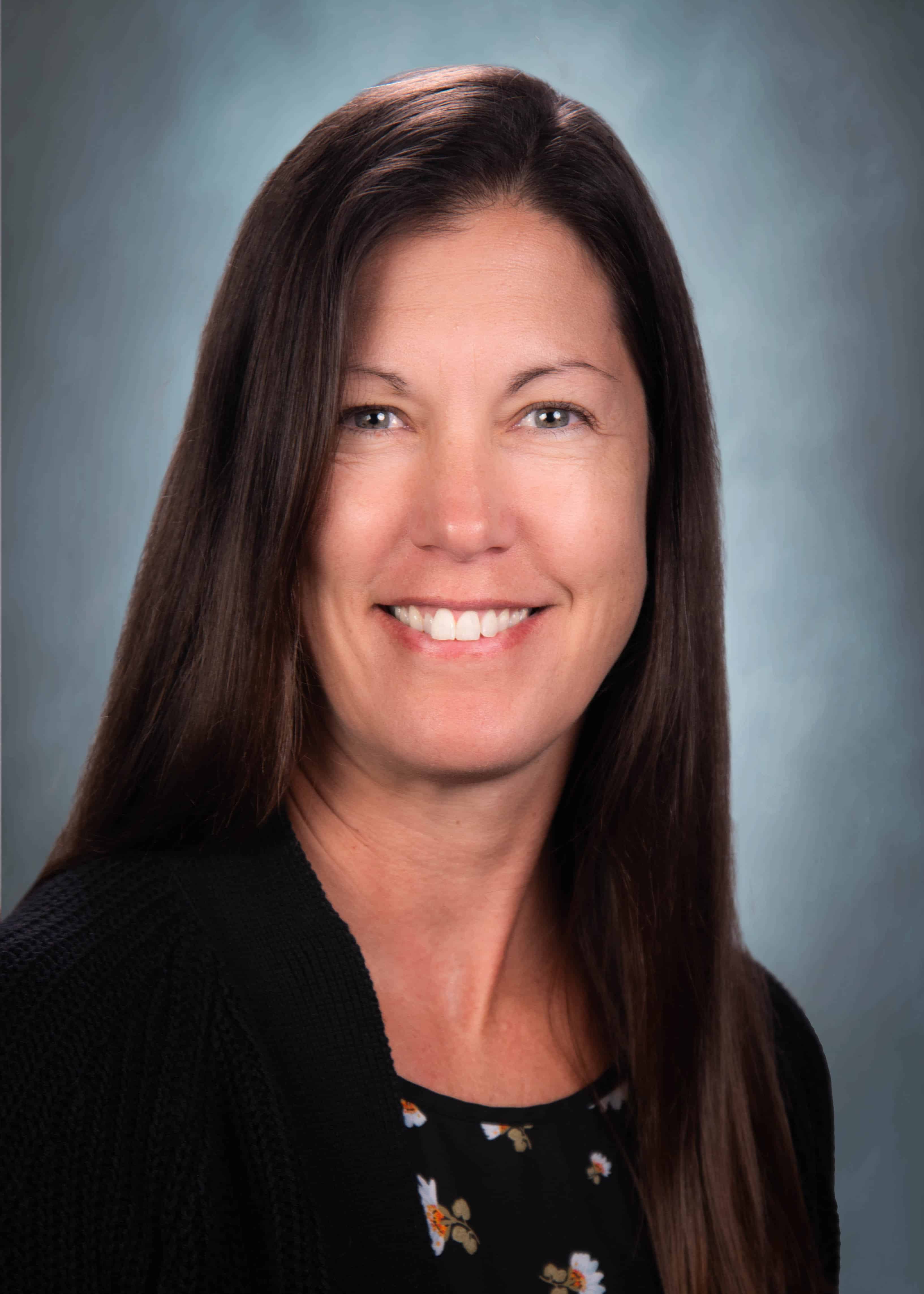
Greenville, N.C. – Dr. Ghanshyam Shantha, cardiac electrophysiologist at ECU Health, recently performed the first procedure at ECU Health Medical Center with a new and innovative device that treats atrial fibrillation (AFib), or an irregular heartbeat – the FARAPULSE™ Pulsed Field Ablation (PFA) System. The FARAPULSE™ PFA is a catheter device that uses electrical fields to target specific tissue areas within the heart that causes an irregular heart rhythm that significantly decrease quality of life and carries the risk of embolic stroke.
“I’m incredibly proud of our electrophysiology team at ECU Health for delivering innovative solutions like FARAPULSE that are making a real difference in the lives of patients here in eastern North Carolina, where many struggle with chronic conditions like heart disease, diabetes and hypertension,” said Dr. John Catanzaro, John “Jack” Rose Distinguished Professor and chief of the Division of Cardiology at the Brody School of Medicine at East Carolina University, and director of the East Carolina Heart Institute at ECU Health Medical Center.
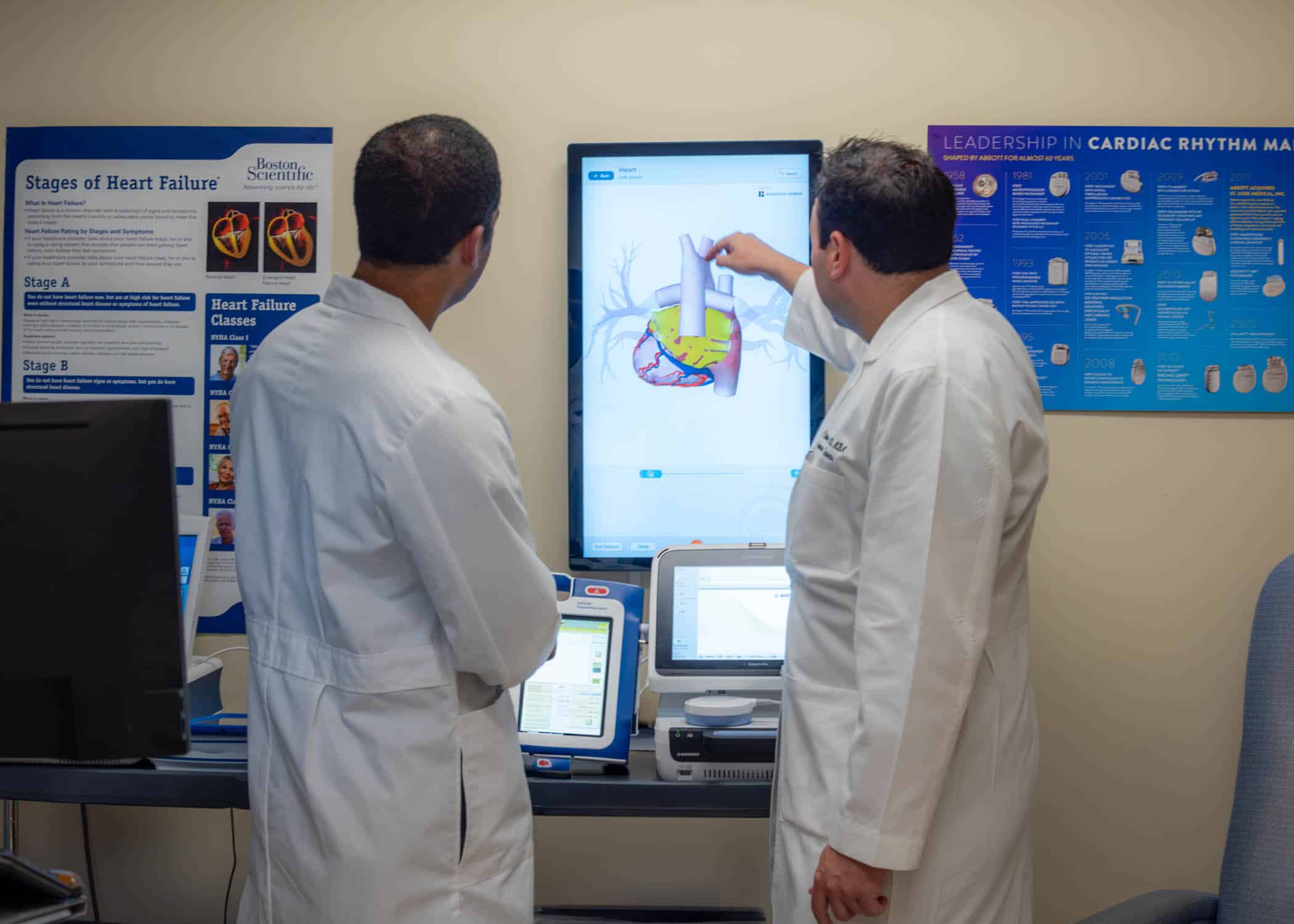
“AFib patients face a significantly higher risk of stroke, heart failure and other serious complications. Our team’s dedication to improving the well-being of our community is reflected in the cutting-edge treatments we’re providing to help reduce these risks and offer a better quality of life for our patients.”
More than 454,000 people are hospitalized with AFib each year in the United States, according to the Centers for Disease Control and Prevention. AFib is a common heart condition where the top chambers of the heart beat irregularly due to disorganized electrical signals in the heart. Paroxysmal AFib occurs when the irregular heartbeat does not happen all the time. Traditional treatments often use heat or cold to burn or freeze the malfunctioning heart cells to get the heartbeat back to normal. Thermal ablations pose a small risk of causing damage to other surrounding areas and complications. The newer ablation option, PFA, uses electrical pulses to target these cells more precisely, significantly reducing some of the complications that can come with thermal ablations.
“We’re thrilled to introduce FARAPULSE as a cutting-edge solution for patients with AFib in eastern North Carolina, where AFib rates are particularly high, and access to advanced care is essential,” said Jay Briley, president of ECU Health Medical Center. “Our teams are dedicated to delivering top-tier cardiac care, and their commitment to providing patients with the latest technology is inspiring. This innovative treatment is yet another step toward ensuring the best possible outcomes for our communities, right here at home.”
According to Boston Scientific, FARAPULSE benefits patients by reducing the risk of damage to surrounding anatomy, shorter procedure duration and better patient outcomes. In fact, more than 80 percent of patients with paroxysmal AFib had no returning symptoms within one year, and almost three-quarters of patients discontinued heart rhythm medications within one year.
ECU Health team members that were part of the new procedure include: Ghanshyam Shantha, MD, MPH; John Catanzaro, MD, MBA, Mark Dixon, RN, Dennis Wood, CVT, and Stephanie Clarke, CVT. As the leading academic health system in eastern North Carolina, ECU Health and the Brody School of Medicine perform nearly 450 ablations each year, ensuring patients can access the latest medical treatments close to home. By combining academic expertise with clinical care, ECU Health not only improve patient outcomes but also provides essential training for the next generation of health care professionals. ECU Health’s leadership in advancing cardiovascular treatments reinforces its mission to improve the health and well-being of eastern North Carolina. To learn more about ECU Health’s heart and vascular services, please visit ECUHealth.org/heart.
Dr. James Speicher, a thoracic surgeon at ECU Health Medical Center and director of the Thoracic Surgery residency program, and his team are working to improve pain management in patients after their surgery.
After meeting with other thoracic surgeons outside of the ECU Health system and hearing a presentation on non-opioid pain management, Dr. Speicher knew it was something he wanted to bring to his thoracic surgery patients in eastern North Carolina.
“I said, ‘That’s a great idea.’ I came back from the meeting and said to the team, ‘Hey, let’s try to do this.’ It took us some time to get access to one of the medications we would use in the pain management protocol, but we started with our protocol multimodal pain management while avoiding narcotics in 2019.”
Dr. Speicher said the new pain management protocol includes a long-acting local anesthetic for nerve blocks, along with a muscle relaxer, nerve pain medication, acetaminophen and anti-inflammatories.
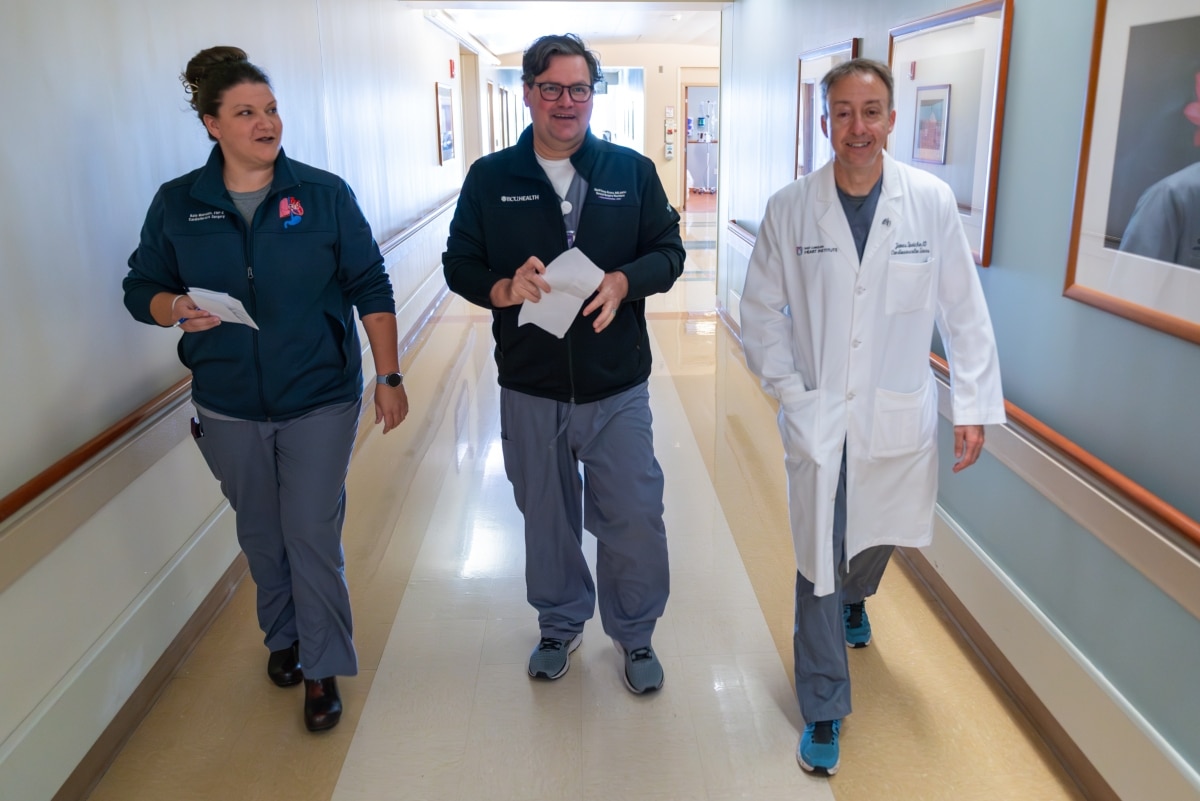
The goal of the program was to send fewer patients home with prescription narcotics while limiting the use of patient-controlled analgesia pumps for patients in the hospital after surgery.
As the team looked at surgical data from 2016-19 and compared it to the study, running from 2019 to today, he said the team found even better results than they were expecting.
“What we found with our study was we had really significant reductions in the uses of opioids. It was around an 85 to 90 percent reduction in our opioid use inpatient and around 60 percent of patients weren’t going home with any sort of narcotic prescriptions,” Dr. Speicher said. “The other thing that was really impressive to me in the study was that our average pain score was actually better for our patients on the non-narcotic protocol. We were reducing the use of narcotics on the floor, sending people home with less prescriptions and introducing fewer opioids into the community, all while actually doing a better job controlling their pain.”
The opioid-free pain management program is part of a larger enhanced recovery after surgery protocol, which Dr. Speicher and his team has been working on over the last few years. He said the team has put in place walking protocols and pre-operative carbohydrate loading along with other changes that have been shown to improve outcomes for patients.
This program is active for thoracic surgeries at ECU Health Medical Center.
“This is exciting work for us because we’re really focusing on helping make patients comfortable, controlling their pain post-surgery and getting them home more quickly,” Dr. Speicher said. “If we can do all of that without a narcotic prescription, that’s a really big win for the patients we serve and the community as a whole.”
Greenville, N.C. – ECU Health performed the first ever pacemaker implantation with Elutia’s EluPro® BioEnvelope on Sept. 5. EluPro, a Food and Drug Administration (FDA)-approved device, is the first antibiotic-eluting device designed to prevent post-operative complications for Cardiac Implantable Electronic Devices (CIEDs) such as pacemakers and defibrillators.
“We are proud to be the first to perform a pacemaker implantation with the EluPro BioEnvelope, which is a testament to the work our cardiovascular teams do every day to improve the health and well-being of eastern North Carolina,” said Jay Briley, president, ECU Health Medical Center. “Being the first to perform this groundbreaking procedure with the EluPro BioEnvelope underscores our commitment to bringing cutting-edge solutions directly to the communities we serve. Our patients can access the highest level of care without the need to travel long distances, ensuring that advanced cardiovascular treatments are available right here in eastern North Carolina.”
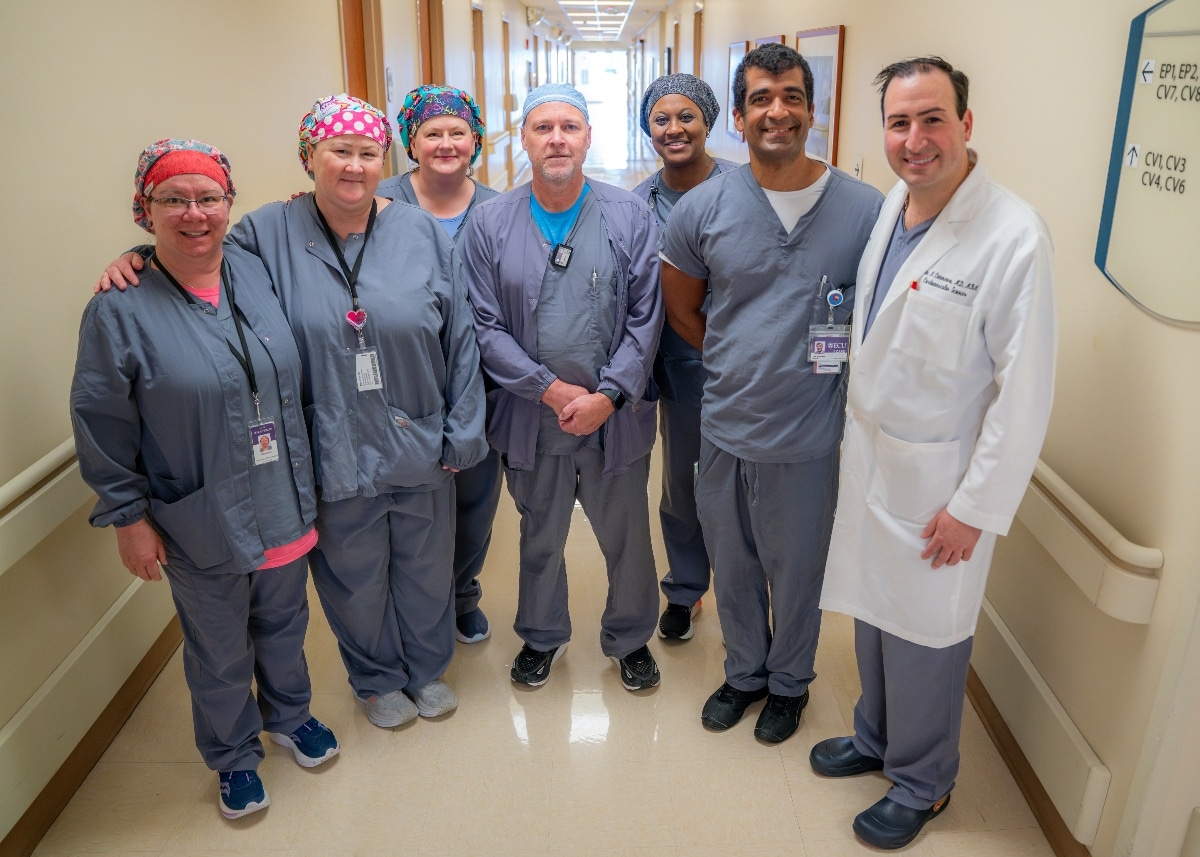
For high-risk patients, including those with underlying health conditions or advanced age, traditional pacemakers carry a risk of complications such as infection, migration and skin erosion, affecting five to seven percent of patients nationwide, according to the FDA. These issues arise when the body’s immune system treats the device as a foreign object, leading to inflammation, device movement, and, in some cases, serious infections. The EluPro BioEnvelope offers an innovative solution for high-risk patients by combining antibiotic therapy with advanced tissue engineering.
“Eastern North Carolina faces high rates of chronic illnesses like heart disease, diabetes and hypertension, making access to advanced cardiovascular care crucial for our community,” said Dr. John Catanzaro, John “Jack” Rose distinguished professor and chief of the Division of Cardiology at the Brody School of Medicine at East Carolina University and director of the East Carolina Heart Institute at ECU Health Medical Center. “Patients with co-morbidities are at higher risk for infection after procedures like pacemaker implantations, and this new technology is a significant step forward in addressing these challenges, as it not only improves patient outcomes but also helps prevent complications that can arise from traditional procedures. I am grateful to the team that helps bring innovations like the EluPro BioEnvelope to our region, demonstrating our commitment to reducing health disparities and ensuring our patients receive the best care possible.”
ECU Health team members that were part of the new procedure include: John Catanzaro, MD, MBA, Jan Lopes, MD, Mark Dixon, RN, David Rouse, cardiovascular technologist, and Tracy Fulcher, cardiovascular technologist. As the academic health system for eastern North Carolina, ECU Health and the Brody School of Medicine perform nearly 1,000 pacemaker implantations per year and ensure patients benefit from the latest medical innovations without having to travel far from home. This integration of academic expertise and clinical care not only enhances patient outcomes but also serves as a vital resource for training the next generation of health care professionals. ECU Health’s commitment to leading the way in advanced cardiovascular treatments demonstrates our ongoing mission to address rural health disparities and improve the well-being of the communities we serve.
Greenville, N.C. – The American Heart Association/American Stroke Association has awarded all nine ECU Health hospitals Get With the Guidelines® achievement awards for their work in treating stroke, diabetes, cardiac arrest, heart attack and heart failure. These awards recognize the health system’s commitment to following up-to-date, research-based guidelines for the treatment of heart disease, diabetes and stroke, ultimately leading to more lives saved, shorter recovery times and fewer readmissions to the hospital.
“ECU Health is honored to receive national recognition from the American Heart Association for our unwavering commitment to providing top-tier care to eastern North Carolina,” said Teresa Anderson, PhD, RN, NE-BC, senior vice president of quality at ECU Health. “These achievements reflect the dedication and expertise of our teams who work tirelessly every day to deliver the best possible care to our patients across the health system. By adhering to the latest research-based guidelines, we are not only improving patient outcomes but also advancing our mission to improve the health and well-being of the communities we serve.”
ECU Health recognitions include:
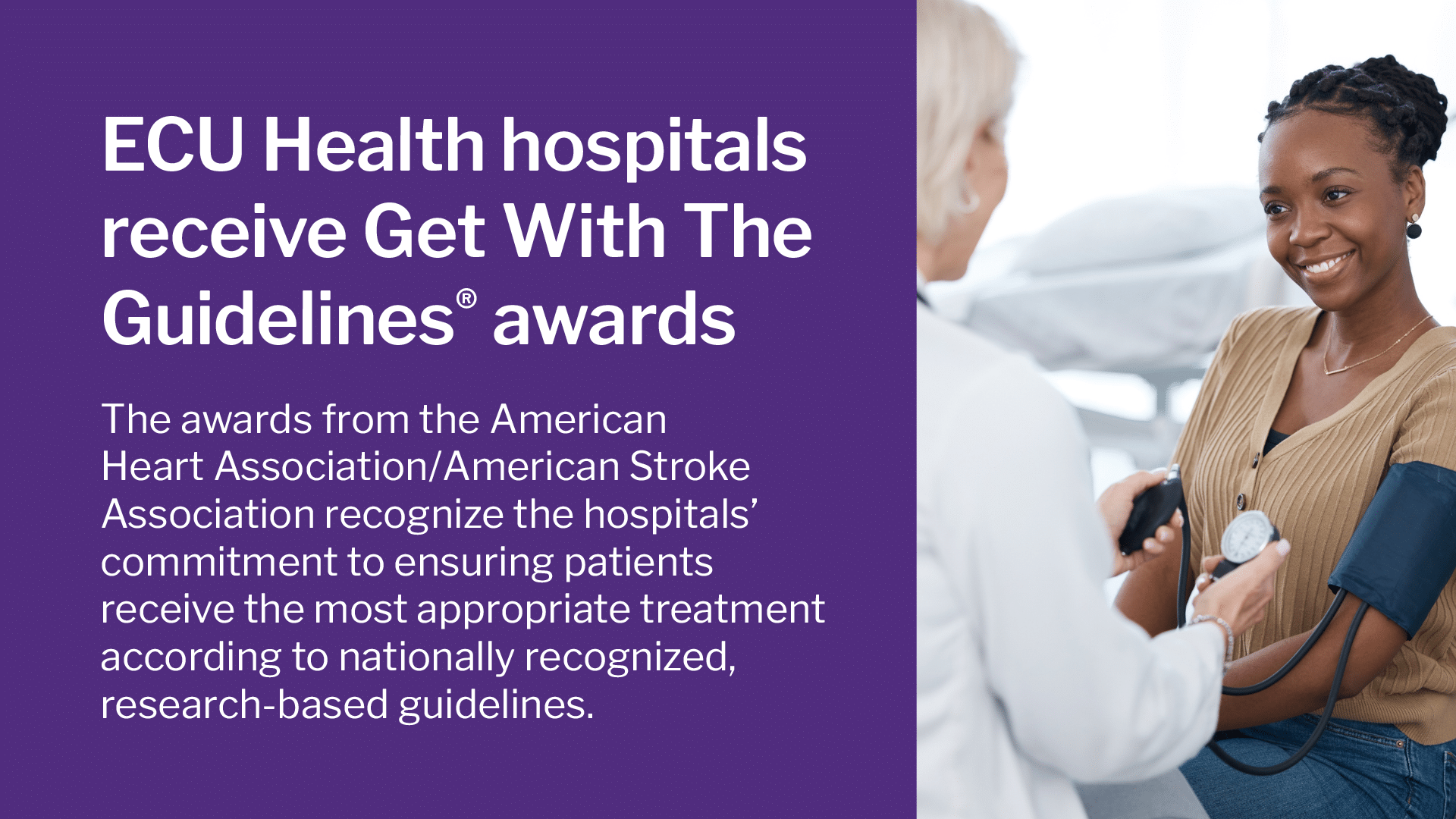
ECU Health Beaufort Hospital – A Campus of ECU Health Medical Center
- Get With the Guidelines – Stroke Gold Plus with Target: Type 2 Diabetes Honor Roll
- Get With the Guidelines – Coronary Artery Disease Rural STEMI Silver
- Get With the Guidelines – Stroke Rural Silver
- Get With the Guidelines – Stroke Rural Bronze
ECU Health Bertie Hospital
- Get With the Guidelines – Coronary Artery Disease Rural STEMI Bronze
ECU Health Chowan Hospital
- Get With the Guidelines – Coronary Artery Disease Rural STEMI Silver
ECU Health Duplin Hospital
- Get With the Guidelines – Coronary Artery Disease Rural STEMI Silver
- Get With the Guidelines – Stroke Gold Plus with Target: Type 2 Diabetes Honor Roll
- Get With the Guidelines – Stroke Rural Silver
- Get With the Guidelines – Stroke Rural Bronze
ECU Health Edgecombe Hospital
- Get With the Guidelines – Coronary Artery Disease STEMI Referring Center Bronze
- Get With the Guidelines – Stroke Rural Bronze
- Get With the Guidelines – Stroke Gold Plus with Target: Type 2 Diabetes Honor Roll
ECU Health Medical Center
- Get With the Guidelines – Resuscitation Gold Neonate/Infant
- Get With the Guidelines – Resuscitation Gold Pediatric
- Get With the Guidelines – Resuscitation Bronze Newly Born
- Get With the Guidelines – Stroke Gold Plus with Target: Stroke Honor Roll Elite Plus, Target: Stroke Advanced Therapy and Target: Type 2 Diabetes Honor Roll
- Get With the Guidelines – Coronary Artery Disease STEMI Receiving Center Gold with Target: Type 2 Diabetes Honor Roll
- Get With the Guidelines – Coronary Artery Disease NSTEMI Gold with Target: Type 2 Diabetes Honor Roll
ECU Health North Hospital
- Get With the Guidelines – Stroke Gold Plus with Target: Type 2 Diabetes Honor Roll
- Get With the Guidelines – Coronary Artery Disease STEMI Rural Silver
- Get With the Guidelines – Stroke Rural Bronze
ECU Health Roanoke-Chowan Hospital
- Get With the Guidelines – Coronary Artery Disease Rural STEMI Silver
- Get With the Guidelines – Stroke Rural Silver
- Get With the Guidelines – Stroke Rural Bronze
Outer Banks Health Hospital
- Get With the Guidelines – Stroke Gold Plus
- Get With the Guidelines – Stroke Rural Silver
- Get With the Guidelines – Stroke Rural Bronze
“Providing high-quality care close to home is essential, especially in regions like eastern North Carolina, where rates of stroke, diabetes and heart disease are significantly higher,” said Dr. Niti Armistead, chief quality officer at ECU Health. “Having access to specialized treatment and adhering to evidence-based guidelines locally ensures that patients receive the best possible care without the added stress of traveling long distances, which can make a critical difference in recovery and overall health outcomes. Get With the Guidelines programs align with our mission of improving the health and well-being of eastern North Carolina by putting proven knowledge and guidelines to work on a daily basis. Patients across our region can take heart knowing that all our hospitals are available to provide them with exceptional care.”
According to the American Heart Association/American Stroke Association, cardiovascular disease and stroke are the leading and fifth leading causes of death in the United States, respectively. On average, someone in the U.S. experiences a stroke every 40 seconds, with nearly 795,000 new or recurrent strokes occurring annually. Stroke claims approximately 140,000 lives each year, accounting for one out of every twenty deaths. The stroke death rate is even higher in eastern North Carolina, underscoring the critical need for preventive measures and rapid treatment. The state also faces a higher prevalence of diabetes and cardiovascular disease. Research indicates that patients experience better recovery outcomes when health care providers consistently adhere to treatment guidelines and programs like Get With the Guidelines.
“These awards show ECU Health’s commitment to caring for those in their community who need cardiovascular care,” said Donald Lloyd-Jones, chair of the American Heart Association Quality Oversight Committee and chair of the Department of Preventive Medicine at Northwestern Medicine. “By following the American Heart Association’s quality improvement protocols, ECU Health can help realize our shared vision of improved patient outcomes, fewer readmissions and lower mortality rates – a win for health care systems, families and communities.”
Dr. John Catanzaro, professor and chief of the Division of Cardiology at the Brody School of Medicine at East Carolina University and director of the East Carolina Heart Institute at ECU Health Medical Center, was recently honored with the prestigious Dr. John “Jack” Rose Distinguished Professorship, recognizing his significant contributions to improving health care delivery, excellence in clinical medicine, administration and academic advancement, including formation of the first Clinical Cardiac Electrophysiology Fellowship at ECU Health.
The Rose Professorship, established by ECU Health and East Carolina University through the ECU Health Foundation and state funds, honors Dr. Rose, a renowned cardiologist and professor. This endowed title supports the director of the East Carolina Heart Institute recognizes Dr. Rose’s exceptional contributions to cardiology and medical humanitarian work. Dr. Rose, who joined ECU Health in 1982 and the Brody School of Medicine in 1990, is celebrated for his dedication to patient care, teaching, and community service. Recipients of this professorship are expected to embody his ideals and passion for teaching, inspiring future generations of medical professionals.
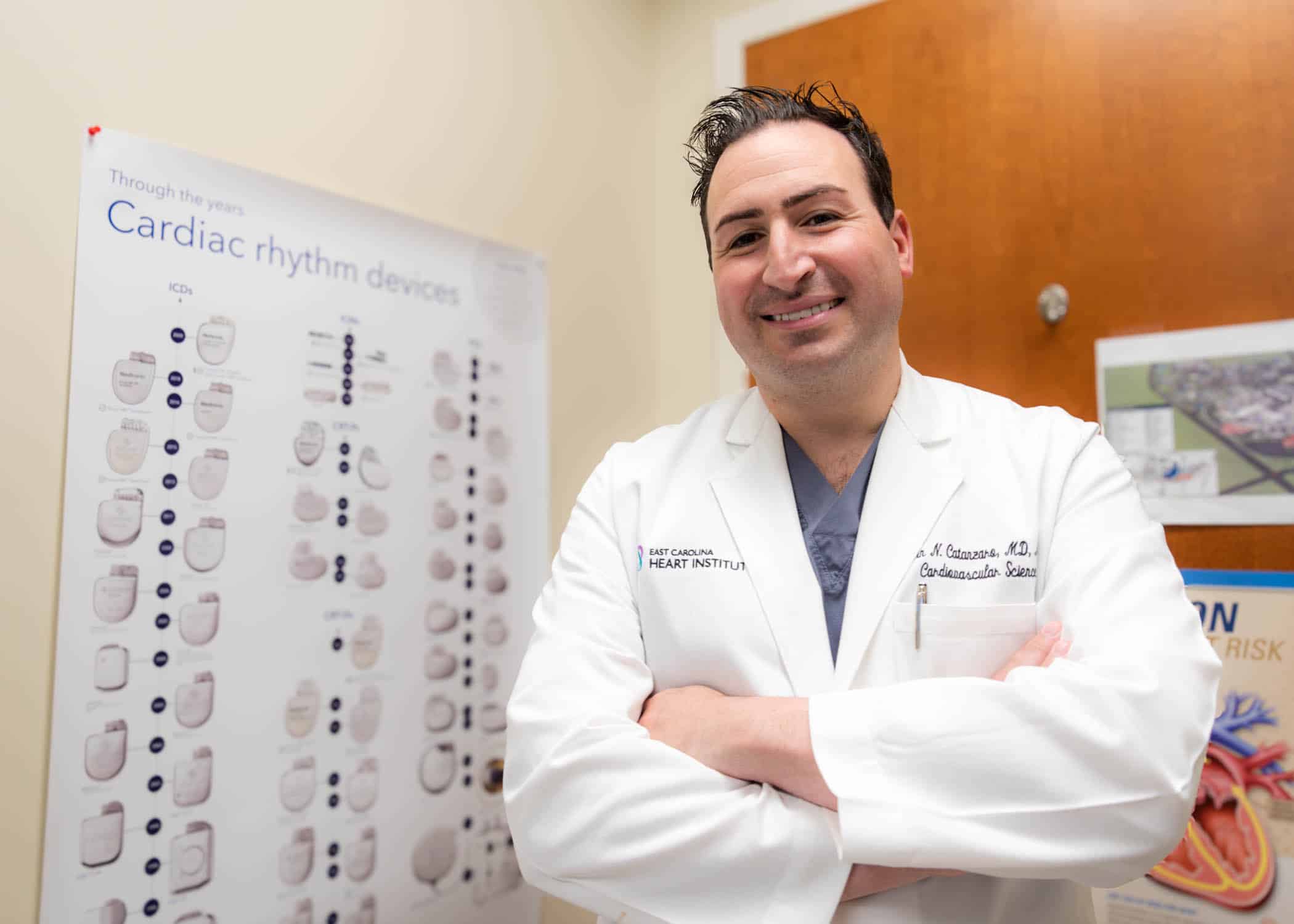
“It’s an honor to be named to the Rose Professorship,” said Dr. Catanzaro. “This title not only recognizes Dr. Jack Rose’s work and legacy, which is focused on humanitarianism and the humanistic qualities of medicine, but it also allows me to highlight and continue his remarkable contributions. As program director, I perform hands-on teaching with trainees during cardiac procedures as well as teach didactic sessions. My primary role is to train the next generation of electrophysiologists to increase access to the patients of eastern North Carolina while maintaining a high standard of excellence in administration and leadership. This professorship is an opportunity to advance Dr. Rose’s legacy of teaching, administration and leadership, ensuring that his impact endures in these areas.”
Dr. Catanzaro completed his Doctor of Medicine with distinction in research at SUNY Downstate Medical Center, followed by an internal medicine residency and cardiovascular disease fellowship at North Shore University Hospital and a clinical cardiac electrophysiology fellowship at The Johns Hopkins Hospital. He also holds an MBA from the University of Florida. He is a Fellow of the American College of Cardiology, Heart Rhythm Society European Heart Rhythm Society and European Society of Cardiology. Dr. Catanzaro is actively involved with the Heart Rhythm Society’s Atrial Fibrillation Stroke Prevention Task Force and serves as vice chair of their Quality Improvement Committee. Nationally recognized for his work, Dr. Catanzaro has delivered invited presentations and chaired panels in the U.S., France, Italy, Germany, England, Romania and more. He also performed recorded procedures for the Heart Rhythm Society Scientific Sessions.
Dr. Catanzaro wanted to transition to an administrative role to broaden his impact beyond individual patients to the entire region and the cardiology division.
“We thought he was the best person for the future of cardiology,” said Dr. Mark Iannettoni, W. Randolph Chitwood, Jr, MD, Distinguished Chair in Cardiovascular Sciences, Brody School of Medicine at ECU and chief, Cardiovascular Service Line at the East Carolina Heart Institute at ECU Health Medical Center. “Dr. Catanzaro possesses a highly entrepreneurial spirit, bringing significant innovation to ECU Health. He has developed new techniques and devices in electrophysiology, advancing our capabilities in device management and patient care.”
The Rose Professorship comes with an endowment, managed by the university, to support ongoing and future initiatives in medical education and innovation. The endowment provides approximately $64,000 annually to advance the cardiology division’s educational and innovative efforts, supporting activities such as purchasing educational equipment, facilitating attendance at conferences, and other educational pursuits.
“The professorship facilitates innovation within the field by providing the necessary funding for new initiatives, such as introducing new devices,” said Dr. Catanzaro. “The goal is to use a certain amount of the endowment each year to support these innovations and to produce more trained physicians for the region. This helps establish our institution as a center of excellence and makes our advancements known.”
Dr. Catanzaro utilized part of the endowment to establish a two-year Electrophysiology Fellowship, admitting one fellow per year, starting this year. Electrophysiologists treat heart rhythm disorders and heart failure with electric devices inserted into the heart. As part of the fellowship, doctors will learn about pacemakers, defibrillators, implantation, ablations, leadless pacemakers, and left atrial appendage closure devices.
“This was one of the fastest fellowships from concept to establishment that we’ve ever done, which just goes to show you how much drive Dr. Catanzaro has,” said Dr. Herb Garrison, former associate dean for ECU’s Brody School of Medicine Graduate Medical Education. “It typically takes two to three years to establish a new residency or fellowship, and we did this in less than a year. That was a record time. And part of that had to do with Dr. Catanzaro and Alyson Riddick, who did an excellent job putting the application together.”
Dr. Jan Lopes is the first fellow in the Electrophysiology Fellowship at ECU Health. He learned about the new program through his cardiology fellowship leader in El Paso, Texas, and decided to join the fellowship because of Dr. Catanzaro’s strong vision for the program.
“Dr. Catanzaro’s enthusiasm for the program and education, along with the opportunity to shape the program for future fellows, attracted me to the fellowship,” said Dr. Lopes. “Despite being a new program, it feels well-established and highly developed. I feel incredibly supported in my role and am receiving top-tier training that rivals what is offered at major medical centers nationwide. We are utilizing cutting-edge technology and performing the latest procedures here at the medical center.”
Training doctors like Dr. Lopes with the latest technology and procedures is important for the future of health care. The need for well-trained electrophysiologists is increasing across the nation and here in eastern North Carolina, according to Dr. Garrison.
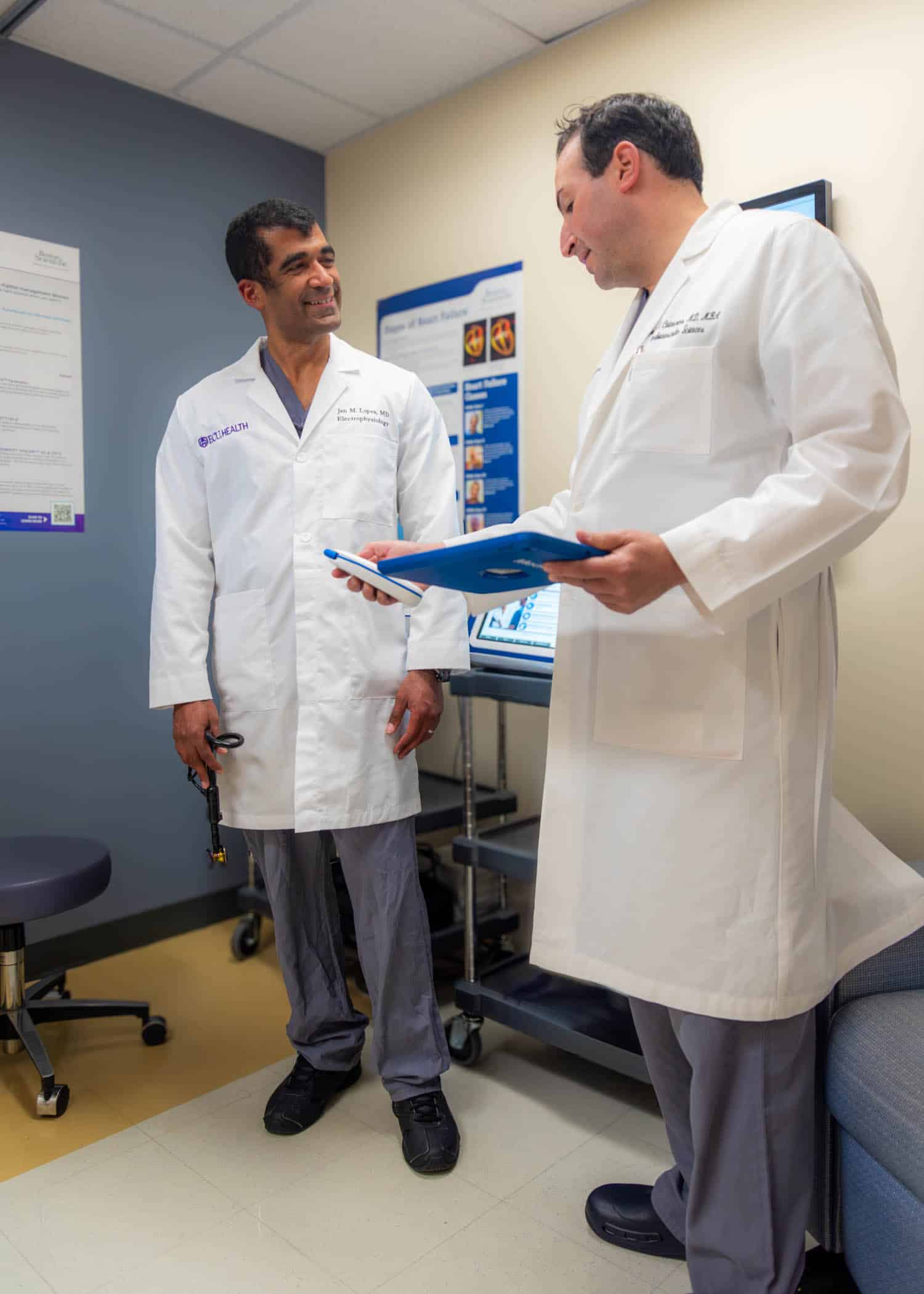
“The incidence of arrhythmias, along with the need for pacemakers and defibrillators, is rising as the population ages, making it a critical area of focus,” said Dr. Garrison. “Establishing residencies and fellowships serves two main purposes: recruiting top-tier faculty and creating a pipeline of skilled electrophysiologists. Faculty are attracted to institutions with trainees, and enhancing our program with excellent faculty was a strategic move by Dr. Catanzaro. This initiative ensures we have the necessary capability and qualified physicians to meet the growing demand for electrophysiology services.”
With the increasing demand for physicians and electrophysiologists trained to treat rural patients, Dr. Catanzaro’s efforts at ECU Health is paying off in the form of improved recruitment efforts.
“Dr. Catanzaro has successfully attracted numerous cardiologists,” said Dr. Iannettoni. “He has excelled at developing divisions within the cardiology department and navigating the integration of academia and medicine. His efforts have resulted in many of our graduates choosing to stay with us, which is a significant benefit of our program. We’re proud to retain our own trainees, ensuring continuity and excellence in our team.”
Greenville, N.C. – ECU Health Medical Center Electrophysiology Lab is the first hospital lab in North Carolina to earn accreditation by the Intersocietal Accreditation Commission (IAC) in Cardiac Electrophysiology in the areas of Testing and Ablation, Device Implantation and Left Atrial Appendage Occlusion. IAC accreditation is a “seal of approval” that patients can rely on as an indicator of consistent quality care and a commitment to continuous improvement.
Accreditation by the IAC means that ECU Health Medical Center Electrophysiology Lab has undergone an intensive application and review process and is found to be in compliance with published standards, thus demonstrating a commitment to quality patient care. Comprised of a detailed self-evaluation followed by a thorough review by a panel of medical experts, the IAC accreditation process enables both the operational and technical components of the facility to be assessed, including representative case studies and their corresponding final reports.
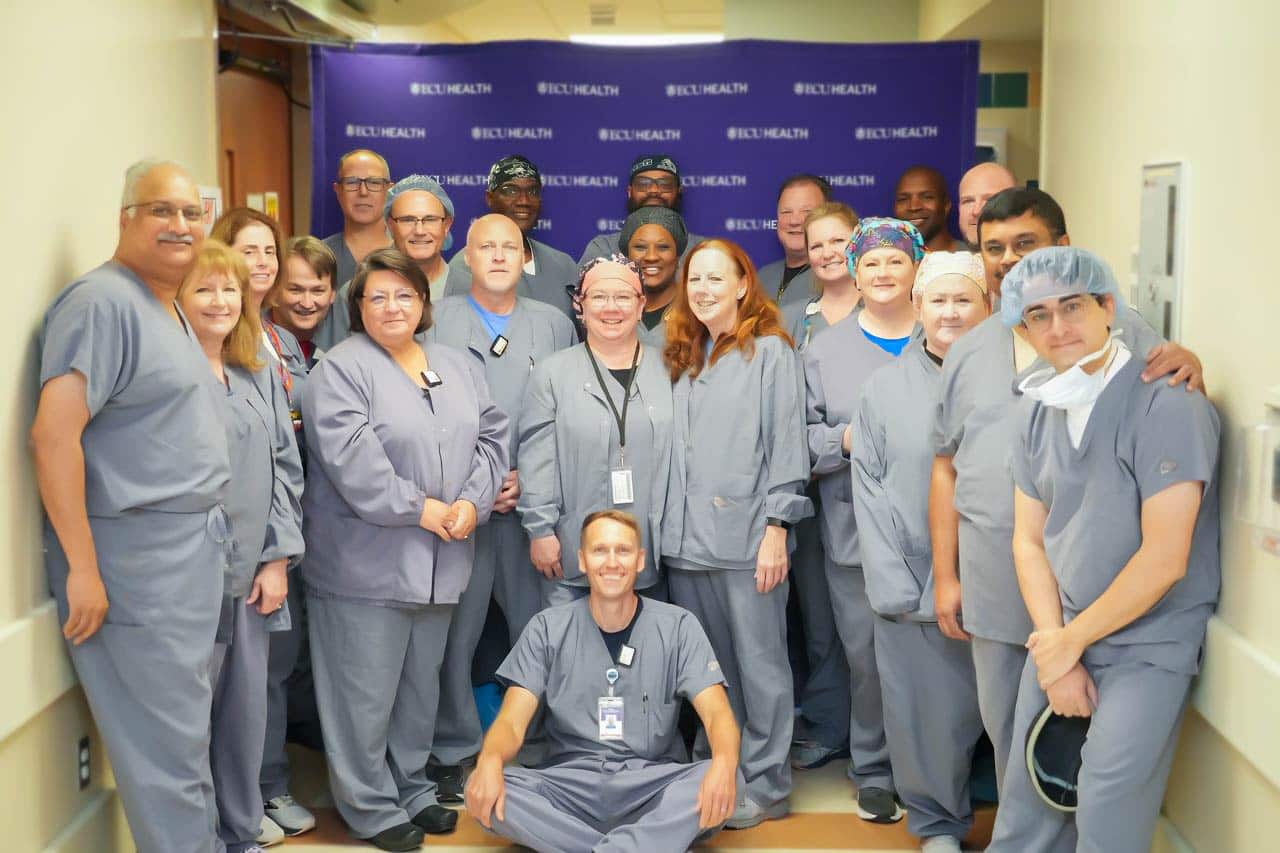
“ECU Health is dedicated to setting a national standard for rural health care and high-quality cardiovascular care,” said Jay Briley, president, ECU Health Medical Center. “Achieving IAC accreditation for the ECU Health Medical Center Electrophysiology Lab not only underscores our commitment to excellence but also highlights the unique advantage of offering advanced care in a rural setting. This milestone reaffirms our mission to enhance the health and well-being of eastern North Carolina by providing the latest technology and medical services close to home.”
Each year, more than one million cardiac device and ablation procedures are performed for the treatment of heart rhythm disorders worldwide. Cardiac electrophysiology procedures are performed by facilities that specialize in the diagnosis and treatment of heart rhythm disorders to relieve symptoms or regulate heart rate and rhythm. Cardiac electrophysiology is comprised of specialized diagnostic testing and therapeutic procedures performed by highly skilled health care professionals. The training and experience of the cardiac electrophysiology specialist performing the procedure, the type of equipment used and the quality assessment metrics each facility is required to measure, all contribute to a positive patient outcome.
“As a cardiologist and electrophysiologist, I know first-hand the importance of having high-quality cardiovascular services close to home for those who live in eastern North Carolina,” said Dr. John Catanzaro, professor and chief, Division of Cardiology, the Brody School of Medicine at East Carolina University, director of East Carolina Heart Institute, ECU Health Medical Center. “This new accreditation underscores our dedication to delivering exceptional patient care through adherence to the highest standards of quality and safety. Patients across eastern North Carolina can take heart knowing the ECU Health Medical Center Electrophysiology Lab has the highest-quality expertise and personnel available to care for them.”
The American Association of Cardiovascular and Pulmonary Rehabilitation’s (AACVPR) Day on the Hill, which was March 4-5 this year, is an opportunity for cardiac and pulmonary rehabilitation professionals to visit Washington, D.C. to advocate for their profession and ask legislators for support for beneficial legislation on Medicare decisions. It was Stacey Greenway’s 10th year participating in this event, a milestone made all the more significant by her recent election as treasurer to the AACVPR board.
Stacey, the director of cardiovascular disease management services at ECU Health Medical Center, wasn’t initially interested in health care policy, but her zeal for her work inspired her to get involved.
“I’m passionate about what I do, and when I realized the impact these legislative decisions make on our patients, I wanted to get involved,” she said. “When the North Carolina Cardiopulmonary Rehabilitation Association (NCCRA), which works on the state level, asked if anyone was interested in participating in Day on the Hill, I thought how cool it would be to help our patients and our programs. After the first time, I was hooked.”
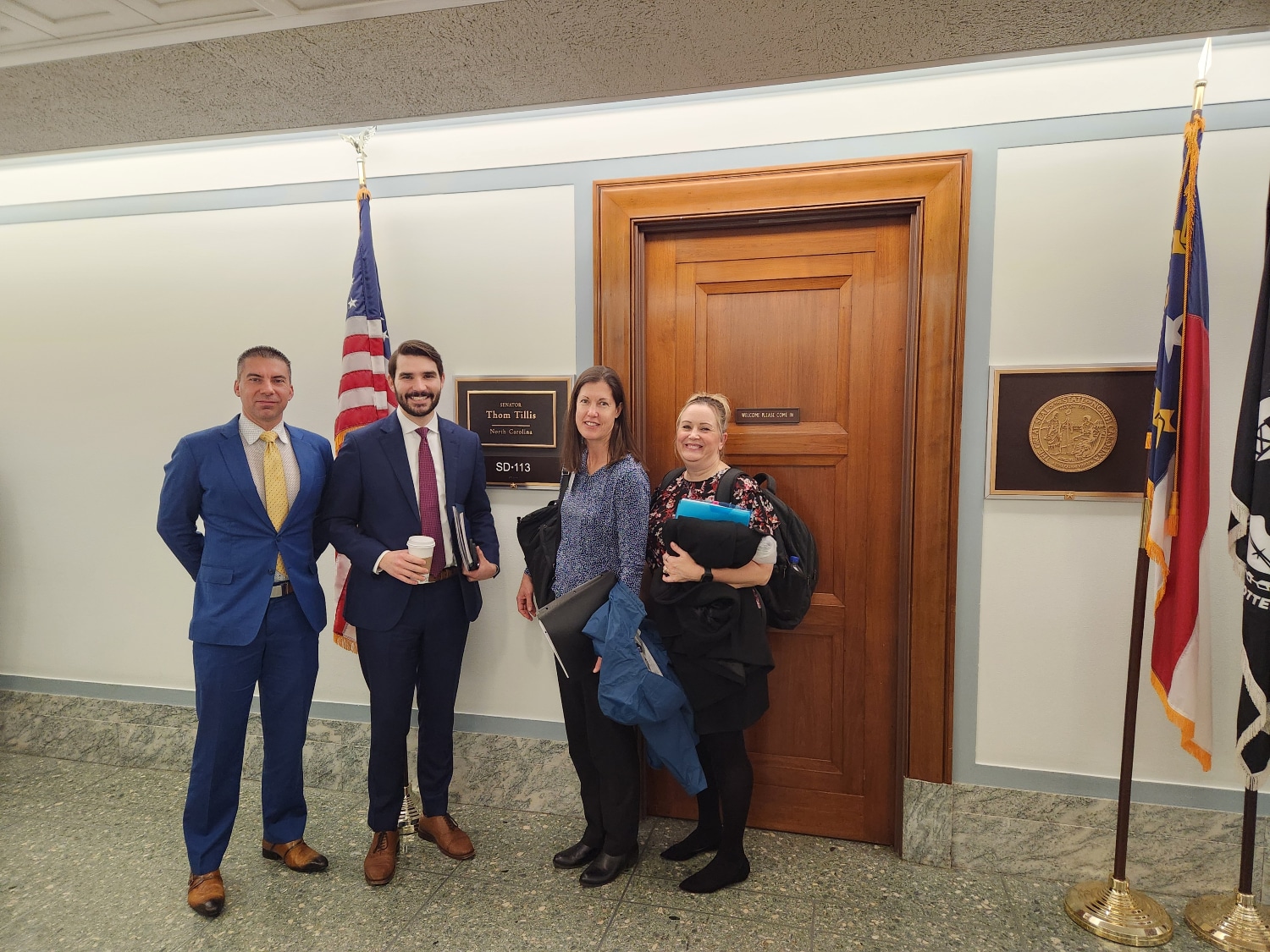
Each year, the AACVPR’s legislative priorities are different, but the goal is the same. “We want to help the legislators see things from the patient perspective and put a face to the people these bills are affecting,” Stacey said. “From that angle, you see the increase in a patient’s quality of life. From a health system perspective, it decreases the rates of hospital readmission. It’s a win-win.”
This year’s priorities centered on two bills: HR-955/S.1849, the Sustaining Outpatient Services Act, and HR-1406/S.3021, the Sustainable Cardiopulmonary Rehabilitation Services in the Home Act. The Sustaining Outpatient Services Act seeks to correct a legislative error from a previous bill that reduces reimbursement for cardiac and pulmonary rehabilitation services when they are provided in off-hospital campus clinics. The reduced reimbursement rate makes cardiac and pulmonary rehabilitation services financially unsustainable and thus eliminates patient access to these resources, especially in rural communities. “Some rural hospitals, which don’t have a lot of real estate on campus, haven’t even tried to open a rehab clinic because of this issue,” Stacey said. This bill would establish an exemption status to certain hospital outpatient services, including cardiac and pulmonary rehabilitation, from that fee reduction.
The Sustainable Cardiopulmonary Rehabilitation Services in the Home Act would allow Medicare beneficiaries to receive cardiac or pulmonary rehabilitation services through real-time telehealth in their homes. This hybrid type of service was very successful during the pandemic, and it allowed more patients to be treated from across eastern North Carolina.
“Think of that 45-year-old patient who had a heart attack and would benefit from rehab services but has also been cleared to work and needs to make an income,” Stacey explained. “This bill would allow that patient to not have to make a choice between income and health; they could do both.”
During her time in Washington, D.C., Stacey and 74 other AACVPR members spoke with their respective House Representatives and Senators to advocate for these bills. Stacey said overall, the discussions were productive.
“I had some good conversations about both bills,” she said. “The telehealth bill was one the legislators could wrap their heads around easier; it was something they were familiar with. That was encouraging.” While more work needs to be done to increase support for the outpatient services bill, Stacey said she felt the needle moved a bit. “This is partly because the government seems to be changing their focus from thinking about the up-front costs of health care to the savings incurred on the back end,” Stacey said. “That means things are changing, and I’m hoping we’ll get a few more co-signatures on that bill.”
As a board member, Stacey said she now has other opportunities to support her profession.
“To represent eastern North Carolina and discuss at the national level some of the things that impact those who practice locally is really important,” she said. Because she was on the board this year, Stacey was also able join the board meeting the day before Day on the Hill and participate in the selection of a new legislative firm. “We met with the firm and prepped for Day on the Hill, but we also strategically planned for the future,” Stacey said. “It was exciting to be involved in that process.”
Stacey’s interest in running for the AACVPR’s treasurer position stemmed from her desire to stay involved in the national organization and escalating care for patients.
“The board is involved in regulatory and government relations, and that’s one of my big interests. Day on the Hill is just one way we stay involved. It’s a way of understanding and supporting initiatives and bringing that back to ECU Health,” she said. “We have six cardiac and pulmonary rehab programs within ECU Health, and I want to make sure those programs are aware of the initiatives the AACVPR promotes to escalate their practice and ensure we’re doing the best we can for our patients.”
Now that the initial conversations with Congress members are over, the next step is to follow up in a few weeks with those representatives still on the fence. “We’ll also bring in a constituent from that person’s district to speak to the impact of these bills,” Stacey said. Some representatives have already signed on to at least one of the bills, including Rep. Don Davis, Rep. Deborah Ross, Rep. Greg Murphy, Rep. Wiley Nickel and Rep. Jeff Jackson.
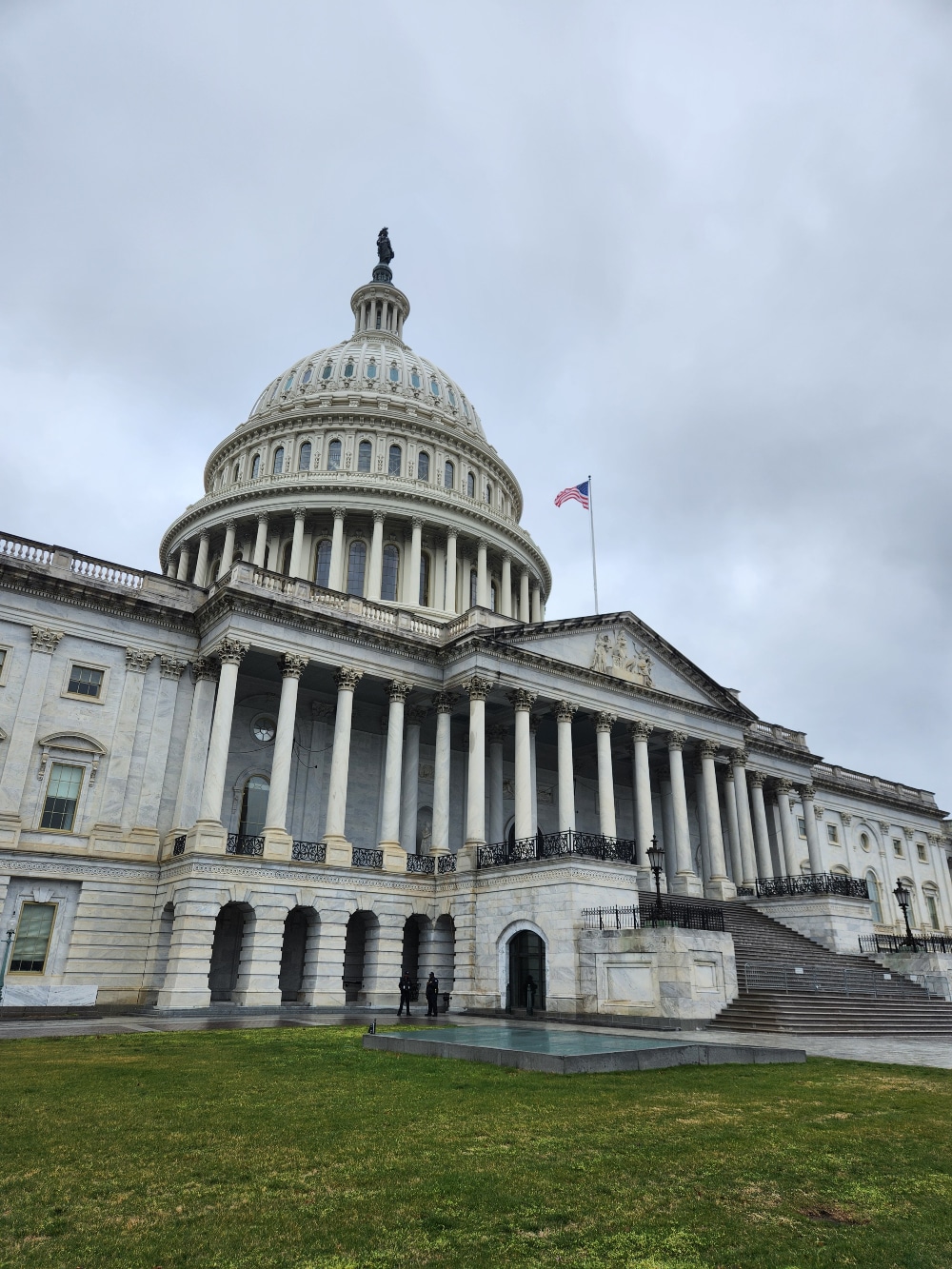
It’s important to be involved in the policy issues surrounding health care, Stacey said. “You don’t go into health care thinking about these operational or political issues, but when you’re faced with the repercussions in the clinic, you see the impact it has.”
She encouraged all health care professionals to get involved: “Let’s do this for the betterment of the patient experience,” she said. “For me, this has been one of the highlights of my professional life.”
Tanya Graham, a North Carolina native and Greenville resident, was outside cutting her grass when she started to feel very tired. That night, she experienced what felt like an asthma attack, so the next day she visited an urgent care clinic. “I do have asthma,” Graham shared, “but I’ve never had an attack.” The doctor ran a few more tests, and after an EKG, he decided to send Graham to the hospital.
“The cardiologist at [ECU Health] Medical Center said, ‘You are in heart failure,'” Graham said. “I didn’t know what he was saying, I was so shocked.”
Dr. W. Douglas Boyd, a cardiothoracic surgeon, told Graham she needed surgery, and two weeks later, Graham found herself back in the hospital recovering from a double coronary bypass. She was told later that her initial ejection fraction, which is the amount of blood your heart pumps each time it beats, had been 10 percent. A normal ejection fraction is 50 percent or higher. “After the surgery, they did another echocardiogram, and now it’s up to 35 percent,” Graham said.
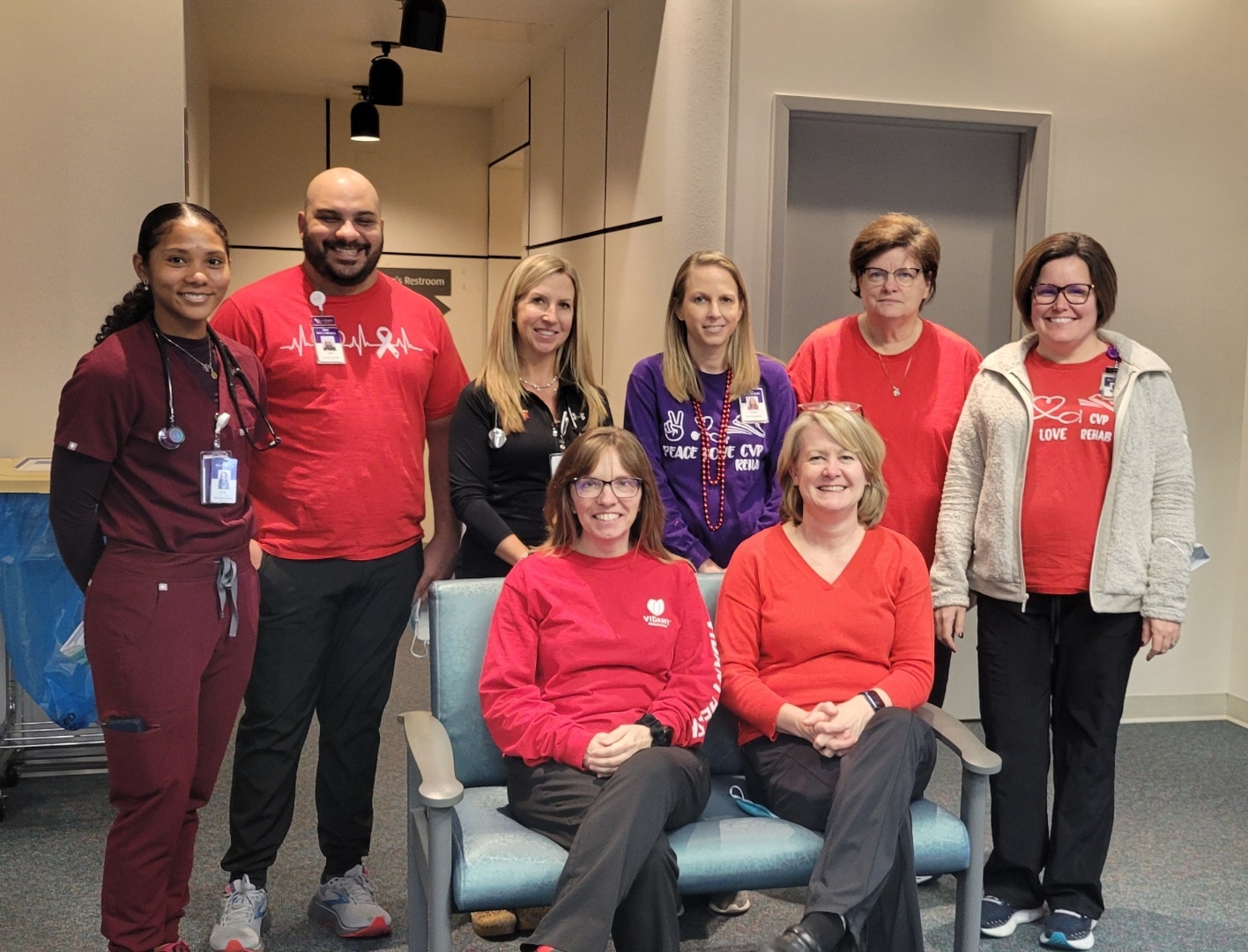
Graham knew that once she was strong enough after the surgery, she wanted to participate in cardiac rehabilitation. She had heard about the option from her neighbor, who also had recently suffered a heart attack. “I also have two sisters who are nurses,” Graham shared. “One of them works for a cardiologist, so I talked with her about cardiac rehab, and all of my siblings agreed it was a good idea.”
Cardiac rehabilitation focuses on the “what now” after a cardiac event. Stacey Greenway, the director for cardiovascular disease management services at the Medical Center, hopes that cardiac rehab will become the immediate program associated with cardiac recovery.
“A multidisciplinary team works with the patients to establish and achieve goals to improve their health, quality of life and functional ability,” Greenway said. “We develop individualized treatment plans for each patient that includes exercise, nutrition, medications, stress management and other components.”
For Graham, therapy started slow, but she said she immediately felt comfortable. “The team is so smart, and they are in tune with each individual person,” Graham said. “It made a huge difference because I learned right off that I could trust them. It made me want to go.”
It also helped to have others around her going through the same experience. “It didn’t matter if they were a man or woman or what race they were – we were all there for the same reason. Our bodies had broken in some way, and we were all there together for the same purpose of trying to survive and extend our lives,” Graham said. “I drew strength from them, because when I saw them working hard, it made me want to do the same.”
The experience didn’t just provide Graham with the chance to get stronger after a major surgery. “The one thing I came away with,” Graham said, “is hope. Hope that I’d live a longer life.” Graham said that it wasn’t just the exercise that encouraged her and helped her get better; it was also the classes they offered. “I learned quite a bit from the classes, which covered things like diet and coping with this diagnosis,” she said. Something Graham didn’t expect was having access to support from a therapist. “I’d had a hard experience with my surgery, so they put me in contact with Dr. Kari Kirian, and she worked wonders. I can’t say enough positive things about that experience.” Dr. Kirian is a cardiac psychologist embedded in the heart failure program – a critical member of the care team as it is not uncommon for patients to experience anxiety or depression after a cardiac event.
While she wished she could have participated for longer, Graham graduated from cardiac rehab with the ability to do the things she needs to do. “It allowed me to come home and do the things you take for granted, like clean the house or roll your hair,” Graham said. She also immediately joined a gym and signed up for personal training to continue her progress. “I left cardiac rehab on a Friday, and that following Monday I was at the gym,” Graham said. “It wasn’t mandated, but the cardiac rehab team provided me with information. My sister goes to a gym, so I decided to go there, and now I go every weekday. I will continue to exercise, think positive and eat right.”
Because she’s feeling so much better, Graham said she has plans for the future. “I’m going to work on making one of my bedrooms a storage space, and in the spring, I plan to paint a shed in the back yard,” Graham said. She also hopes to visit her daughter and grandchildren in Phoenix, Arizona next winter. In the meantime, Graham said she’s cleared it with her doctors to serve as a volunteer in the cardiac rehab unit. It’s one way she can share her experience and give back to the amazing Cardiac Rehab team for impacting her life in an incredible way.
“I don’t care what I do. I just didn’t want to leave there,” Graham said. “I love people, and I thought maybe if I was around people going through what I went through, I could tell them my story and help them.”
The VAD (Ventricular Assist Device) program at ECU Health Medical Center has recently undergone its fourth successful Joint Commission survey, receiving exceptional praise.
As the largest health care accrediting body in the nation, the Joint Commission emphasizes patient safety and quality of care. The Joint Commission surveys the program’s compliance every two years with more than 40 standards organized into six different chapters in the disease-specific care manual.
ECU Health Medical Center’s VAD program is led by a team committed to providing cutting-edge care for patients relying on ventricular assist devices. A ventricular assist device is a surgically implanted device that helps in the functioning of the heart‘s pumping mechanism. At the Medical Center, VAD patients are often cared for in the following specialized units: CVICU, CIU, CICU, ED and Medical Rehab.
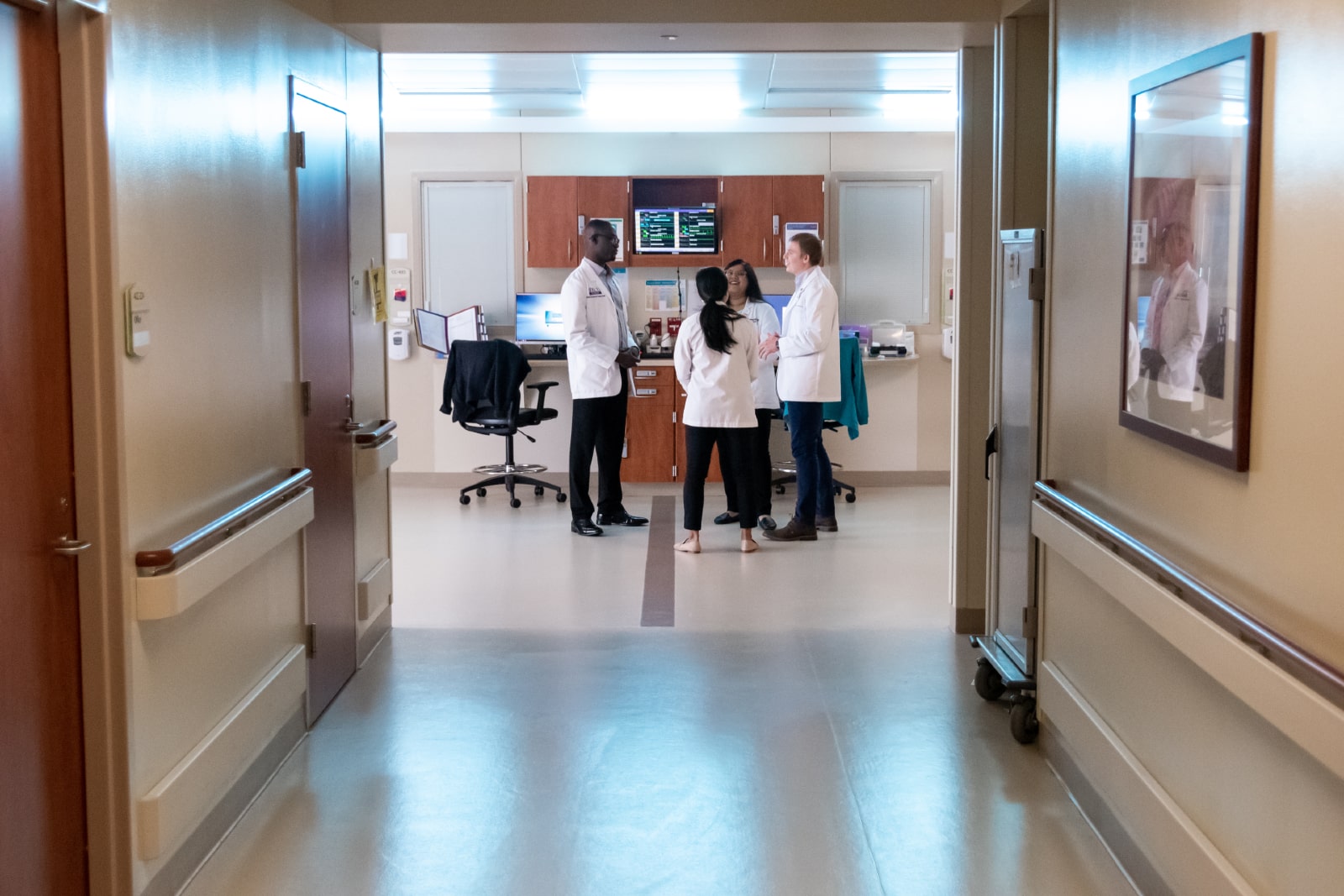
The surveyors highlighted the VAD program’s holistic approach to patient care, acknowledging the dedication of the multidisciplinary team.
“The survey holds our VAD program accountable and ensures that we are providing the highest quality and safest care possible to our patients,” said VAD Coordinator Andrea Matthews. Reflecting on her own participation in the program, Matthews shared her appreciation. “Having the opportunity to be involved in this program and care for this specialized patient population is truly an honor.”
VAD Coordinator Emily Knight echoed this sentiment and emphasized that the resilience of patients and their families is what makes her job rewarding. Knight shared that she’s excited to see what the future holds for the program.
“I am thankful that ECU Health is able to provide this care and treatment close to home for the patients of eastern North Carolina,” Knight said. “I am excited to see the program grow and evolve to reach more patients in our community.”
Since its inception in 2017, ECU Health’s VAD program has grown significantly. The program has successfully implanted 71 left ventricular assist devices (LVAD) and currently cares for 43 patients. Courtney Saunders, advanced heart failure cardiologist, expressed her gratitude for the exceptional individuals within the VAD team who play a crucial role in the program’s success.
“It has evolved into the program it is through the individuals recognized by the surveyor developing a gold standard of LVAD care,” Saunders said. The surveyors specifically highlighted Dr. Tae Joon Lee, Dr. Kari Kirian and Terrani Moore.
Jay Briley, ECU Health Medical Center president, joined the surveyors in commending the team for their hard work in this achievement.
“The Joint Commission survey results demonstrate the program’s dedication to excellence, teamwork and patient-centered care,” Briley said. “Congratulations to all the teams involved in the successful survey.”
